In an environment in which savings accounts are paying close to 5% in the UK, Iboss Asset Management has warned investors not to ignore the merits of multi-asset investing for the perceived safety of cash.
According to the latest Investment Association statistics, over the year to August 2023, investors ploughed some £1.18bn into short-term money market funds as sentiment for risk assets continued to deteriorate.
The peak of these inflows occurred in March and April when the IA Short Term Money Market grouping attracted net retail inflows of £769.8m and £666.6m respectively, placing the sector at the very top of the sales charts for those two months.
While demand has cooled slightly since, Iboss chief investment officer Chris Metcalfe said advisers were increasingly reporting that clients are querying the merits of investing in risk assets over cash.
“This unfavourable backdrop for investing in risk means clients have been holding off making new investments or topping up investments or withdrawing multi-asset funds and topping up cash,” he added.
While cash savings clearly offer some measure of security and are low-risk, Metcalfe warned they typically provide lower returns than “riskier” options such as equities and bonds, while interest rates may struggle to keep pace with inflation, potentially eroding the purchasing power of savings over time.
“We have always believed cash is an asset class in its own right and should always play a part in holistic financial planning – and, for most investors, be part of their multi-asset portfolio investment,” he continued. “That said, careful consideration must be given to both time frames and the relative attractiveness of cash versus other asset classes.”
Falling equity valuations
Metcalfe noted that, in 2021, money flowed into both cash and equities, even as valuations became more expensive on a weekly basis. “Since then, valuations have fallen in many world areas, but equity flows have reversed,” he said. “Although cash rates have markedly improved over that period, unless your investing philosophy is only, and forever, to hold cash, why is this not a good opportunity to buy the non-expensive parts of the equity market?”
After years of paying virtually nothing, Metcalfe said he was not surprised banks and building societies were now championing their savings rates – while he was also aware that when markets fall it is difficult for investors to put money into equities.
“The more significant the fall, however, the better the relative entry point,” he argued. “Both bonds and equities dropped sharply in 2022 and 2023 and, so far, we have seen only small gains in equities and further losses in bonds so, intuitively, cash looks like the best place to invest right now.”
Yet for Metcalfe, there is a reason why a saying like “don’t put all your eggs into one basket” is so well-known, and that is because, in his words “it is just common sense”. “Investing is no different to many other aspects of life,” he said. “No matter how compelling the narrative, putting all your assets in just one is very unlikely to be the right answer.”








